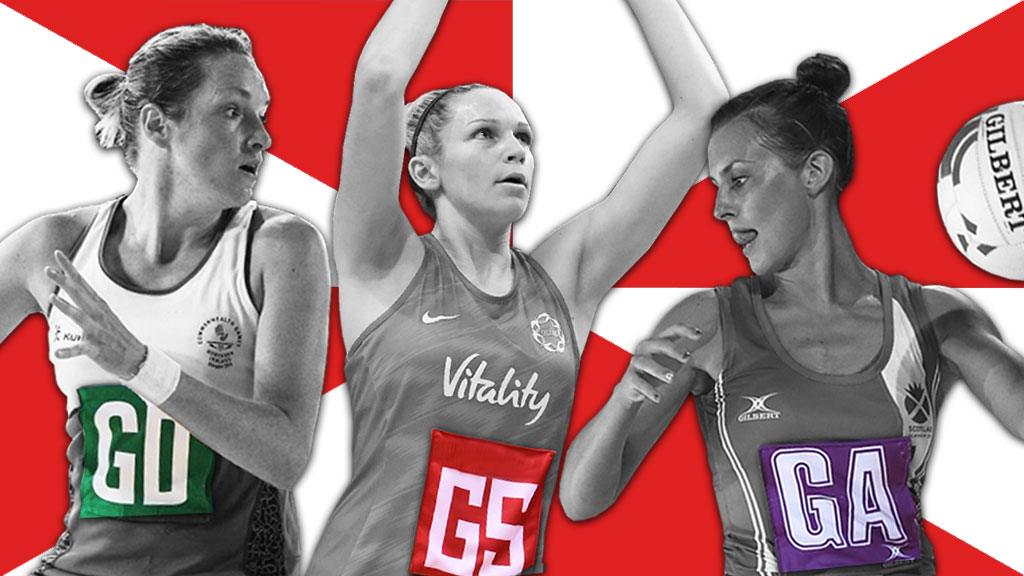'Father's Day, you can't escape it' - how sport helped Wales netball player Clare Jones heal hurt
- Published

Clare Jones plays centre, wing attack or wing defence for Wales and Celtic Dragons
To anyone without a father, Father's Day can be a painful reminder of what has been lost.
It is no different for Wales and Celtic Dragons netball player Clare Jones, whose father died of cancer when she was four years old.
Jones, 30, a trainee clinical psychologist, poignantly made her international debut on Father's Day, an event that she says highlights how important sport can be in helping people deal with difficulties in their lives.
"The build-up of Father's Day I have sometimes felt quite difficult, you can't escape it. It's there in shop windows, on the radio," the centre, wing attack or wing defence told Radio Wales Sport.
"But adversity gives us an opportunity to develop compassion, it allows us to develop tolerance of uncertainty and give us a better understanding of life in unfortunate circumstances.
"How sport nurtures that has just been incredible and some people will never know the impact they have had on me at times where I have, perhaps, struggled and been a bit sad, or had dad at the back of my head.
"Being in an environment where for two hours, or however long you're training or playing for, nothing else matters.
"And I've had team-mates who keep morale up, who keep that very present and allow you to be free.
"That is the absolute beauty of sport... it's given me life skills that have helped me... when there have been hardships.
"If someone is struggling and you've not maybe tried connecting with other people through sport, give it a go."
Jones' father, David, was 40 when he died of leukaemia, leaving her, her then eight-year-old brother and her mother devastated.
"I remember it being explained that we had to say goodbye to my dad," said the former Bishop Vaughan Catholic School and Gorseinion College student.
"We come from a family that has a huge amount of faith and my mum's faith, being the strongest, has always kind of said that we will see him again and he'll be always with us, we'll very much keep his memory present.
"I guess as a four-year-old, quite systematically, you're told that piece of information, it's happened, and you kind of move on.
"I guess for some years that was probably my narrative, that grief was something that you're able to move on from."
Grief 'suddenly felt quite fresh'
Things changed when Jones moved away from home to study at Exeter University - studying for a BSc in psychology and later an MSc in psychological research methods - when she found herself having to explain to new people her family situation.
"That probably was a point in my life where I realised that grief was not just a case of being able to acknowledge it and park it, it's absolutely a process. I certainly had to attend to a lot of thoughts and feelings why all of a sudden it was feeling quite fresh," she said.
"You probably never move on from it, but it does become a part of you and you can move with it."
So it was a particularly moving moment when a then 24-year-old Jones was capped by Wales for the first time on Father's Day in 2016, making her international debut as wing defence in South Africa in the final game of a three-Test series.
"I was thinking of what word describes that moment and I've just never been able to pinpoint one word," she said.
"It was just so exciting; my family were just so excited for me and that was just the narrative of the tour."
Unfortunately given the distances and timing, her family were unable to be courtside for that moment, but her team-mates rallied round.
"They clearly had said, right, we keep Clare distracted, we keep her upbeat, nothing changes," Jones remembered.
"They know me and know that I would not want any distraction from the task at hand - which was to go out and beat South Africa.
"They were just brilliant and I remember... [Wales centurion and captain] Suzy Drane was one of the first people I saw and she just gave me a wink and a little bit of a nod, and that was enough.
"So we got to the game and it was Suzy in the last quarter handed over her bib to me and said to me, 'okay, let's go, it's your time'.
"This was meant to be and I loved it... I remember that final whistle going and I honestly have never felt so connected to my dad. It just felt that moment was a little reminder for me that he is there, he is watching and keep going, because this was what it was for.
"So that narrative of Father's Day for me, I smile. I've played now again in Superleague on Father's Day and I love it, because I think this is for me and him.
"He loved his sport, he loved his rugby and he would love to be here, and he is."
If you have been affected by issues raised in this article, there is information and support available on BBC Action Line.
Listen to the full interview and the rest of the Radio Wales Sport programme on demand here.
Related topics
- Published10 July 2019
